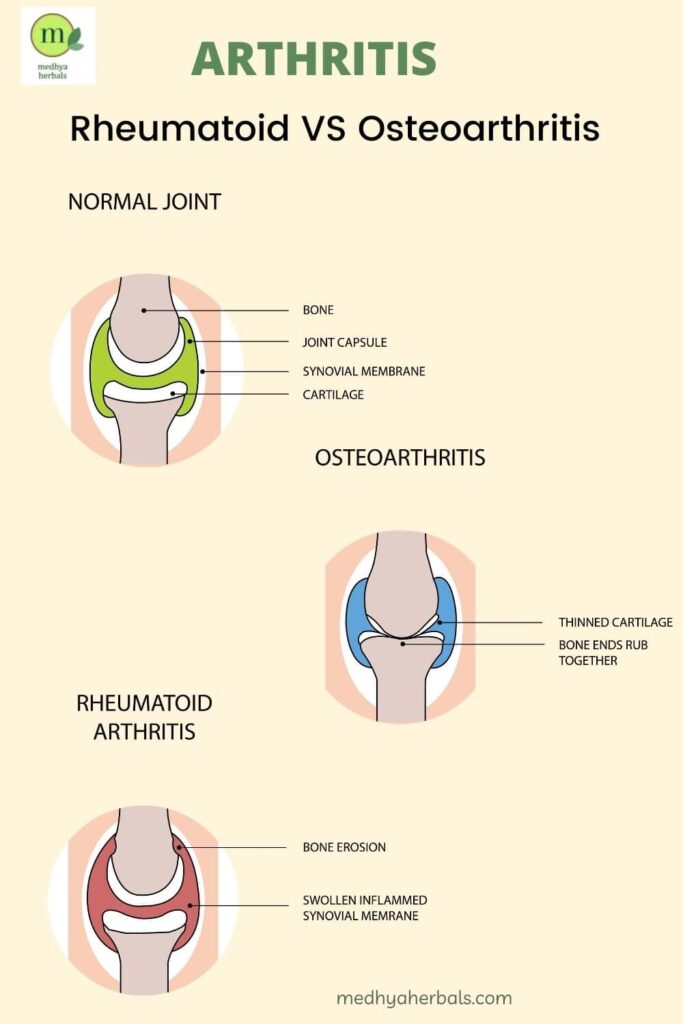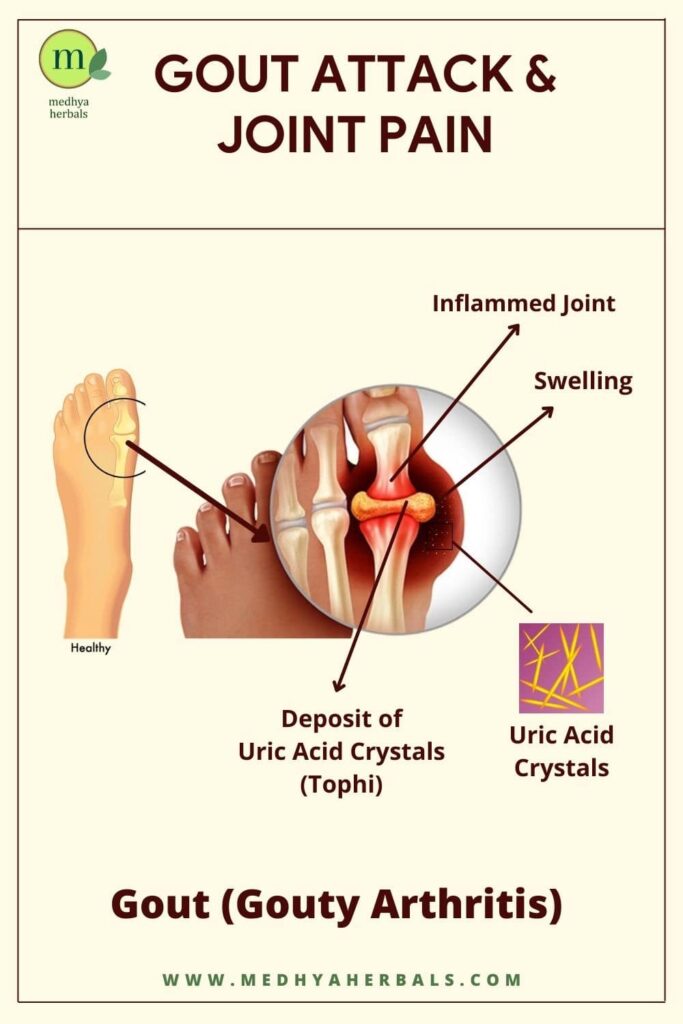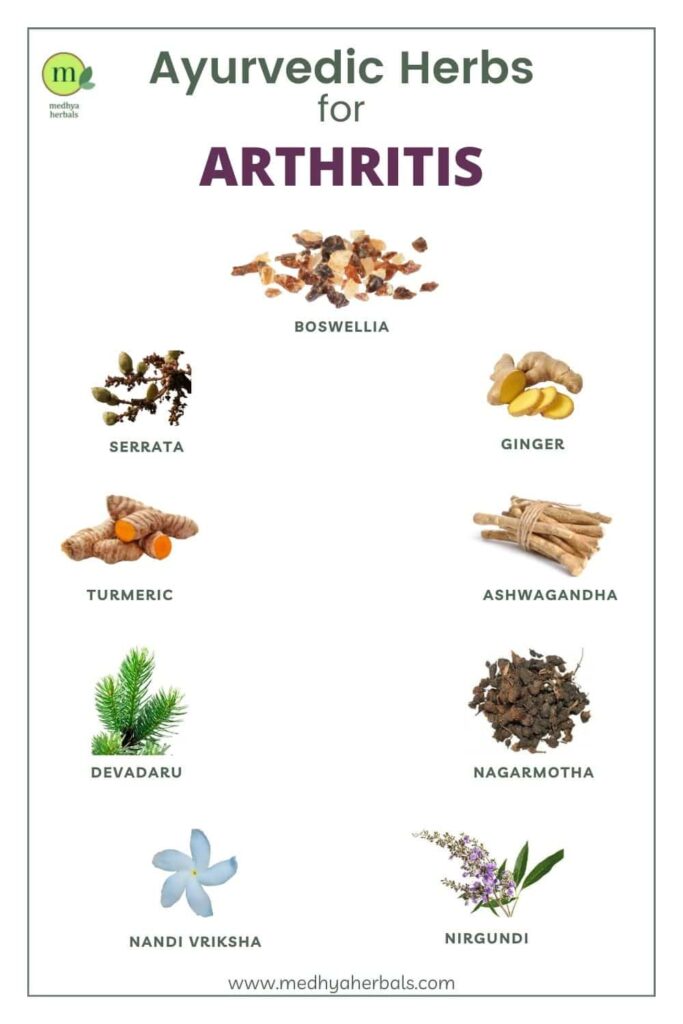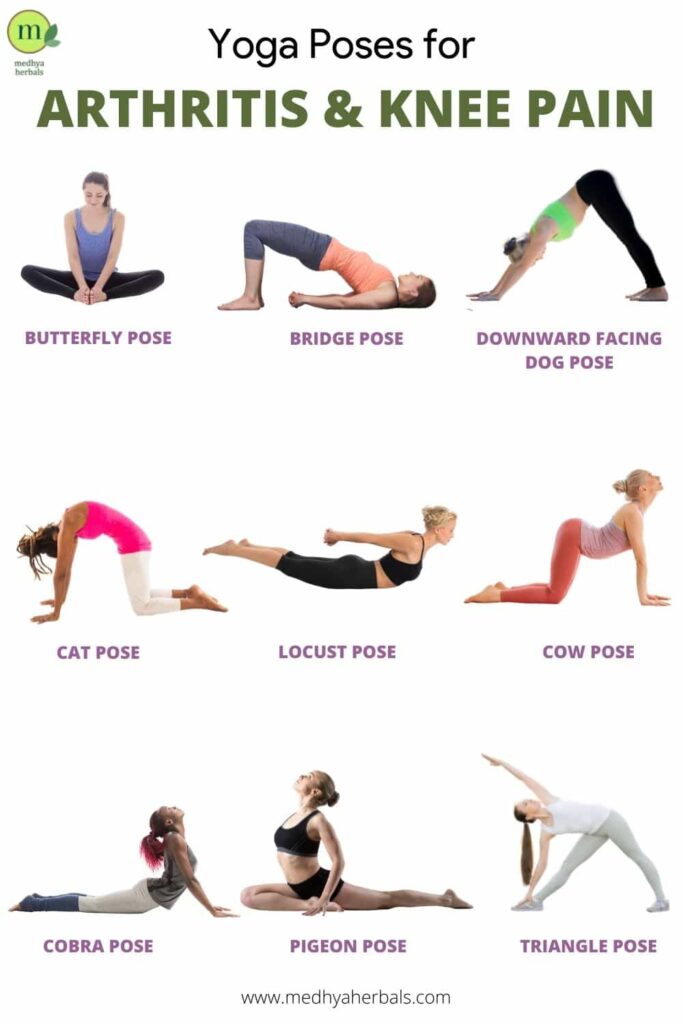Arthritis is a condition characterized by inflammation and pain in the joints. It is a common problem that affects people of all ages. While there are many treatments available for arthritis, Ayurveda offers a holistic and long-term approach to reduce Arthritis related pain and support healthy bones & joints.
According to Ayurveda, the root cause of Arthritis is imbalanced doshas and “ama” or toxin build up in the body. There are a variety of Ayurvedic treatment options for rheumatoid arthritis and joint pain, including Ayurvedic medicated oil, herbal medicines, adopting an Ayurvedic anti-inflammatory diet per your body type, yoga therapy and lifestyle modifications.
In this blog post we will discuss some of the most effective Ayurvedic herbal medicines, best diet and yoga asana that will naturally help you to reduce inflammation and heal the joints Let’s begin!
What is Arthritis?
Arthritis is a group of conditions that cause inflammation and pain in the joints. There are different variations of arthritis and each type affects the joints in a different way.
Usually, the bone joints of hands, knuckles, wrist, fingers, jaw, foot, neck, spine, upper and lower back, in knee and hip are the affected areas.
Besides joints, there are some other types of arthritis that can also affect the heart, lungs, kidneys, eyes, and skin. The most common type of arthritis is osteoarthritis, which is a degenerative disease that affects the cartilage in the joints. Other types of arthritis include rheumatoid arthritis, psoriatic arthritis, and gout.

An Ayurvedic View of Arthritis
Arthritis is known as ‘sandhivat’ in Ayurveda. It is a condition which arises when there is an imbalance in vata dosha. Vata is responsible for movement in the body. When it becomes unbalanced, it can cause problems like pain in the joints, stiffness and inflammation.
The main reason for this imbalance is lifestyle factors like stress, unhealthy diet and lack of exercise.
Ayurveda recommends a number of herbs and remedies to help restore balance in vata dosha and relieve symptoms of arthritis. Some of the best herbs for arthritis include ginger, turmeric, boswellia and curcumin. These herbs help to reduce inflammation and pain, and improve mobility and flexibility.
Symptoms of Arthritis
The symptoms of arthritis can differ from person to person. They may be mild, moderate, or severe from time to time. Sometimes, the symptoms can continue to be the same for years, or grow very slowly and then they may increase and get worsened eventually. The most common symptoms of arthritis include:
Joint pain and tenderness – Tenderness on the joints and pain have been a common symptom of Rheumatoid Arthritis and Osteoarthritis. Usually, the symptoms are worse in the evening or early mornings.
Loss of joint function – The patient may encounter difficulty in folding the joints affected with the disease. This can in turn cause difficulty in walking, folding of body parts, and bending.
Joint stiffness – Stiffness of the joint causing the patient to put extra effort to bend the body parts.
Fatigue – Although fatigue and tiredness can be due to other medical conditions, it can indicate Rheumatoid Arthritis too.
Weight loss – Arthritis can lead to unexplained weight loss to the patient. A thorough diagnosis will be necessary to confirm the reason for the same. Rheumatoid Arthritis can cause weight loss.
Weakness – Weakness is a common symptom associated with Rheumatoid Arthritis.
Other common symptoms are:
- Redness of the skin and a feeling of warmth around the inflamed joint.
- People with severe arthritis experience chronic pain, become unable to do usual activities and face difficulties in walking or climbing stairs.
- It can change the look of the joints and may give rise to uneven finger joints, but these can only be seen on X-ray.
The 4 Types of Arthritis
Arthritis can affect anyone at any age, but is most common in adults over the age of 65. Arthritis affects women more often than men, and is the leading cause of disability and restricted movement for women. Here is a brief on major types of Arthritis:
1. Degenerative Arthritis | Osteoarthritis
Osteoarthritis, the most common type of arthritis, which is degenerative in nature. It occurs when the protective layer of cartilage that cushions the joints and allows for smooth movement (shleshaka kapha), breaks down.
Osteoarthritis can happen due to normal aging process, excess wear and tear of the joints, obesity, infections, injury or due to hereditary factors.
Usually, knees are the most affected area for Osteoarthritis. Thus, it severely restricts your movement and comfort. There are fewer or no signs of swelling and fever in Osteoarthritis.
If Osteoarthritis is not treated in time, joints can lose their strength and pain may become persistent.
In earlier stages of osteoarthritis, the symptoms are mild and you can manage them by:
- by hot and cold therapies
- regular physical activity
- Keeping a balance between activity and rest
- maintaining a healthy weight
- giving support to the muscles around the joints
- taking help of assistive devices
- using over-the-counter (OTC) pain relievers or anti-inflammatory medicines
- avoiding more recurring movements
When the joint symptoms are severe and by that, you have limited mobility, some of the above management strategies may be useful. However, for long term relief to improve mobility, you should look to treat Osteoarthritis at the root cause level.
2. Inflammatory Arthritis | Rheumatoid Arthritis
Our immune system protects the body and maintains the body. It helps reduce internal infection and prevents disease. But, sometimes the immune system goes wrong and by mistake attacks the joints with uncontrolled inflammation, leading to joint wearing down and may harm internal organs, such as eyes and other parts of the body.
The examples of this type of inflammatory arthritis are Rheumatoid arthritis and psoriatic arthritis.
In the case of rheumatoid arthritis – an autoimmune disease, the inflammation affects the working of the immune response. Ignorance and late treatment of rheumatoid arthritis can cause a deformity in joints.
Symptoms of rheumatoid arthritis are worse in the morning or early evening:
- Fatigue and loss of appetite
- Weight loss
- Lumps under the skin, hands, and elbows
- Local rise in temperature of affected areas, heaviness and swelling of the parts
- Restricted movement
- The red blood cell count decreases with the presence of mild fever
- Dry eyes and mouth
3. Psoriatic Arthritis
It happens in people that are suffering from the inflammatory skin disorder Psoriasis. Psoriasis, which also appears in multiple ways primarily affects the skin leading to red and white patches, scales, and rashes.
Psoriatic Arthritis affects the skin, joints and surrounding tissue. Its prime areas of the target are the fingers and toes, leading to pitting and discoloration of the nails. Sometimes, it may be accompanied by Spondylitis.
This is an extreme case of inflammation and toxins deposition, where multiple Doshas in the body get aggravated.
4. Infectious Arthritis
There are some bacterium, virus or fungus enter in the joints and trigger inflammation. Some examples of bacteria are salmonella and Shigella (cause food poisoning or contamination), chlamydia and gonorrhea (cause sexually transmitted diseases) and hepatitis C (leads to a blood-to-blood infection, mainly through shared needles or transfusions).
Mostly treatment with antibiotics can cure the joint infection, but sometimes it is difficult to cure chronic arthritis.
5. Gouty Arthritis

Our body creates uric acid after breaking down purines. This is present in human cells and in many foods. When your body produces more uric acid naturally than the required amount or the body fails to clear them quickly, you will have high levels of uric acid.
Sometimes the uric acid creates needle-like crystals in the joint which give rise to extreme joint pain or a gout attack. Gout can rise and fall in periods or, if the uric acid levels aren’t managed, it will be chronic, causing severe pain and disability.
Ayurvedic Treatment for Arthritis
The focus of the Ayurvedic treatment for arthritis is to remove toxins from the body and correct the imbalance of Doshas. Ayurveda believes that there are three primary functional energies or Doshas in the human body- Vata, Pitta, and Kapha. An imbalance in any of these can lead to the development of diseases. Ayurveda uses the principles of Panchakarma to treat arthritis.
Panchakarma is a systematic detoxification process that is applied under the supervision of an Ayurvedic doctor. It involves the use of Ayurvedic medicines, therapies and diet to flush out the toxins. Ayurvedic herbs used for this purpose are known to improve the function of the affected joint and remove the inflammation.
Arthritis treatment in Ayurveda also focuses on strengthening the immunity of a patient in addition to preventing further inflammation in the joints.
A Permanent Cure for Arthritis & Joint Health Issues
The treatment for different types of arthritis varies according to the underlying cause and severity of the condition. For the inflammatory arthritis, Ayurveda treatment handles the inflammation first before treating the joints. In most cases, there is inflammation throughout the body even though it is only exhibited locally. But in both cases, the ultimate goal is to strengthen the muscles around the joint and tone the soft tissue. Dietary and lifestyle changes are also needed for prevention of joint health issues and treatment in the long term.
Ayurvedic Treatment for Rheumatoid Arthritis
Rheumatoid arthritis or “Amavata” is associated with excessive toxins.
There are two main things that cause arthritis: Ama and Vata. To get rid of rheumatoid arthritis for good, you need to treat the problem slowly and steadily. This will involve a series of authentic Ayurvedic treatment as physical therapies involving heat treatment, dry massage and Ayurvedic medicines to detoxify, remove inflammation and improve mobility of the patient.
These treatments will help improve your digestion, which will in turn reduce the amount of Ama produced
Ayurveda for Osteoarthritis
Ayurvedic treatment for Osteoarthritis, “Sandhivata” or “sandhigata vata” involves Ayurvedic massage with medicated oil of the affected areas. At the same time, Ayurvedic medicine, diet and yoga therapy are applied to enable better movement, joint healing and detoxification.
Ayurvedic Medicines and Herbs for Arthritis
There are a number of Ayurvedic medicines and herbs that can be helpful in treating arthritis. Some of the best herbs for arthritis include:

1. Boswellia Serrata – also known as Indian frankincense, this herb is beneficial in relieving chronic inflammation and knee joint pain. Studies indicate that osteoarthritis patients benefited from boswellia along with other Ayurvedic herbs.
2. Ginger – It is a natural anti-inflammatory herb that improves digestion, thus prevents formation of toxins. It is also helpful to reduce severe pain and inflammation in the knee joint.
3. Turmeric – This common kitchen spice is also a powerful anti-inflammatory herb that can help to reduce chronic inflammation and pain in the joints.
4. Ashwagandha: This herb has a host of benefits from helping your hair shine, to reducing stress and anxiety. For patients of arthritis, ashwagandha’s ability to reduce inflammation is particularly important.
5. Musta or nagarmotha: It is a beneficial Ayurvedic herb. It is frequently used as a diuretic and to prevent intestinal illness. It also helps decrease inflammation in the body, which is exactly what persons with arthritis require.
6. Devadaru: This herb has anti-inflammatory effects, which assist with pain and inflammation. It aids in the elimination of harmful chemicals that cause joint discomfort. It promotes digestive fire endurance and detoxification, therefore assisting with toxin production reduction.
7. Nandi Vriksha: This herb is an antioxidant in nature and helps manage inflammation. It is one of the commonly used herbs to help manage arthritis related pain.
8. Nirgundi: It’s an effective Ayurvedic herb for almost any type of joint ailment. Nirgundi can also help to alleviate swelling and severe discomfort. Its powerful anti-inflammatory, anti-convulsing, and antioxidant qualities aid in the recovery of joints back to their normal condition rapidly.
Home Based Ayurvedic Remedies for Arthritis Treatment
Apart from herbs, there are a number of home remedies which can be helpful in treating arthritis. Some of the most effective home remedies include:
Hot and cold compresses – this is one of the most simple and effective home remedies for arthritis. Applying a hot compress to the affected area helps to reduce inflammation and pain, while a cold compress can help to reduce swelling.
Epsom salt bath – adding Epsom salt to your bath can help to relieve stiffness and pain in the joints.
Apple cider vinegar – ACV is another natural remedy that can be helpful in reducing inflammation and pain in the joints. Add 1-2 tablespoons of ACV to a glass of water and drink twice a day.
Ginger tea – ginger is a natural anti-inflammatory and can help to reduce pain and inflammation in the joints. Add 1-2 teaspoons of fresh ginger to a cup of hot water and steep for 10 minutes. Drink 2-3 times a day.
Castor oil – Castor oil arthritis cures are considered effective and safe. It can be applied externally or taken internally. For external application, soak a cloth in castor oil and place it on the affected joints and swollen parts of the body. To make this remedy more effective, place a hot water bottle over the soaked cloth and leave for up to 45 minutes. This helps reduce inflammation and pain in the joints.
Ayurvedic diet for Arthritis
A poor diet can lead to inflammation and toxin build up, both of which are known to contribute to Rheumatoid arthritis. Additionally, eating a healthy diet that is low in inflammatory foods and filled with nutrient-rich fruits and vegetables can help keep your joints healthy and reduce the risk of developing Rheumatoid arthritis or osteoarthritis.
Ayurveda also recommends a specific diet for arthritis patients. The diet should be easy to digest and should not aggravate the symptoms. Usually your Ayurvedic practitioner (doctor) will prescribe set of foods and diet according to your body constitution.
Ayurvedic diet consists of all 6 “Rasa” or tastes that provide balanced nutrition and are helpful in relieving symptoms of arthritis.
Some of the best anti-inflammatory foods for arthritis patients include:
Fresh fruits and vegetables – include plenty of fresh fruits and vegetables in your diet as these are rich in antioxidants and other nutrients that can help to reduce inflammation and pain.
Whole grains – whole grains are high in fiber and beneficial nutrients that can help to improve joint health.
Healthy fats – include healthy fats like Omega-3 fatty acids in your diet as these help to reduce inflammation and pain. Sources of Omega-3 fatty acids include salmon, walnuts and flaxseeds.
Herbal teas – drink herbal teas like ginger tea, turmeric tea or boswellia tea regularly to help reduce inflammation and pain.
Ayurvedic lifestyle for Arthritis Treatment
Along with a healthy diet, it is also important to live an Ayurvedic lifestyle to relieve symptoms of arthritis. Some of the best ways to live an Ayurvedic lifestyle include:
Regular exercise – regular exercise is essential for good health and can help to improve joint health. Try to include a variety of exercises in your routine, such as yoga, Pilates, and stretching.
Stress-relieving techniques – stress can aggravate the vata dosha and lead to symptoms of arthritis. practising stress-relieving techniques like meditation, deep breathing or yoga regularly can help to reduce stress and keep vata in balance.
Balanced lifestyle – try to live a balanced lifestyle with plenty of time for relaxation and enjoyment. Balance work and home life, eat a healthy diet and get regular exercise to help keep vata in balance and relieve symptoms of arthritis.
Good Sleep – getting enough good quality sleep is essential for good health and can help to reduce inflammation and pain in the joints.
Yoga Asana for Arthritis Pain Relief

Regular practice of yoga is another great way to help relieve painful symptoms of arthritis. However, be careful when you do stretches and poses. You don’t want to do anything that is uncomfortable.
Yoga has a lot of different modifications for every pose, which is great. Over time, your flexibility, circulation, and strength will improve gradually. Yoga poses that are beneficial for arthritis include:
Camel pose – this pose helps to open up the chest and stretch the spine.
Fish pose – this pose helps to lengthen the spine and open up the chest.
Frog pose – this pose helps to stretch the hips and groin muscles.
Downward dog – this pose helps to lengthen the spine and stretch the hamstrings.
Warrior II pose – this pose helps to strengthen the thighs and glutes, and stretches the hip flexors.
Some other useful poses for Arthritis related pain relief are:
Butterfly Pose, Bridge Pose, Cat Pose, Cow Pose, Cobra Pose, Locust Pose and Triangle Pose.
Takeaway
Arthritis can be a very painful condition, and it can often be difficult to find relief from the pain in your joints. However, Ayurvedic treatment for arthritis offers a range of options that can help to relieve the pain at root cause level.
Ayurvedic treatments are safe and natural, and they can provide long-term relief from the symptoms of arthritis. If you are looking for Ayurvedic treatment for arthritis, try Medhya Herbals’ health programme and treatment for Arthritis and Bone Health.
FAQ
1. Can Ayurveda cure arthritis permanently?
Ayurveda is an holistic system of medicine that can permanently treat lifestyle disorders as Arthritis at the root cause level. Ayurvedic treatment for Arthritis can help to reverse the inflammation and degeneration in the joints, ease the painful symptoms and considerably improve the quality of life of the Arthritis patient. Ayurveda for arthritis involves detoxification to remove the “Ama” from the body, regular massage with medicated herbal oils to reduce inflammation and pain, dietary changes, yoga, and herbal supplements.
2. What foods make arthritis worse?
Arthritis is a common condition that can cause pain and inflammation in the joints. While there is no cure for arthritis, there are certain foods that can make the symptoms worse. Some of the worst offenders include nightshade vegetables like tomatoes and potatoes, dairy products, caffeine, alcohol, and processed foods. These foods can trigger inflammation in the joints, making the pain and stiffness associated with arthritis more severe. In addition, they can also interfere with the body’s ability to absorb medication. If you suffer from arthritis, it’s important to avoid these trigger foods as much as possible. By making some simple changes to your diet, you can help to reduce the symptoms of arthritis and improve your quality of life.
3. What is the fastest way to cure arthritis?
Arthritis is a debilitating condition that can cause immense pain and discomfort. Ayurvedic medicine is one of the oldest forms of medicine, and it offers a range of natural treatment options for arthritis. Herbal supplements, massage therapy, and yoga are just a few of the ways that Ayurveda can help to ease the pain of arthritis. In addition, Ayurveda focuses on lifestyle changes that can help to prevent the onset of arthritis. For example, maintaining a healthy diet and weight, managing stress levels, and getting regular exercise can all help to reduce the risk of developing this condition.
References
- The efficacy of Ayurvedic treatment for rheumatoid arthritis: Cross-sectional experiential profile of a longitudinal study
- Management of rheumatoid arthritis (Aamavata) using symbiohealth healthcare system
- Ayurvedic treatment for rheumatoid arthritis: What to know
- Comparative effectiveness of a complex Ayurvedic treatment and conventional standard care in osteoarthritis of the knee – study protocol for a randomized controlled trial
- Effect of panchakarma and Ayurvedic treatment in postpartum rheumatoid arthritis (amavata): A case study

